CIC’s leadership development programs continue to provide support and learning for many campus roles. Following a comprehensive review, CIC successfully launched an enhanced curriculum across our leadership programs including the Executive Leadership Academy (ELA), Senior Leadership Academy (SLA), Workshops for Department and Division Chairs (DDCW), and Presidential Vocation and Institutional Mission (V&M) program. CIC continues to build on the strength of these programs and strives to ensure that they remain responsive to the current moment.
Executive Leadership and Senior Leadership Academy
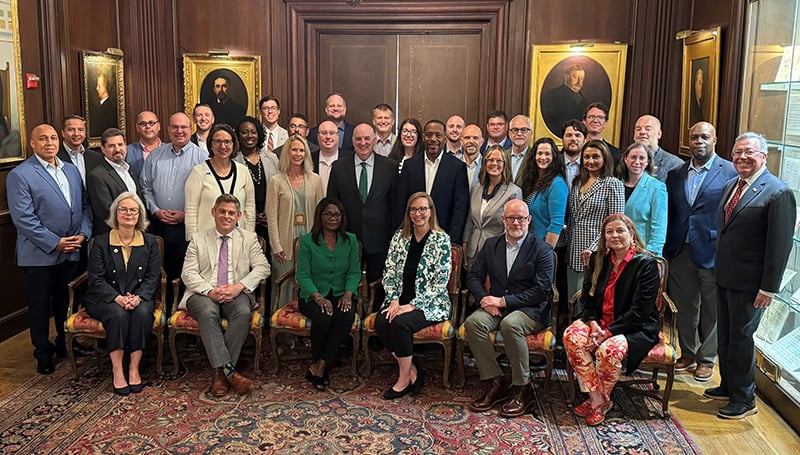
The Executive Leadership Academy (ELA) is cosponsored by the Council of Independent Colleges (CIC), the American Association of State Colleges and Universities (AASCU), and the American Academic Leadership Institute (AALI) to prepare experienced provosts and vice presidents to move to positions of greater responsibility, including presidencies. The 2025–26 cohort, comprising 18 carefully selected participants from CIC institutions across the US, began their yearlong journey with an engaging opening seminar in Washington, DC, on June 16 and 17. They were joined by a selection of industry experts to discuss topics such as “Building an Inclusive Cabinet and Team” and “Working with Your Board,” as well as a lively discussion about the current landscape of higher education.
Meanwhile, the Senior Leadership Academy (SLA) is a yearlong program for administrators in higher education who aspire to cabinet-level positions in independent colleges or universities. This year’s program welcomed 40 promising leaders who have already meeting virtually, and will convene for their first in-person meeting in Indianapolis this October.
Selection for these programs remains competitive, and CIC continues to receive more qualified applications than we can accommodate, highlighting the sought-after nature of these leadership development opportunities.
Workshops for Department and Division Chairs
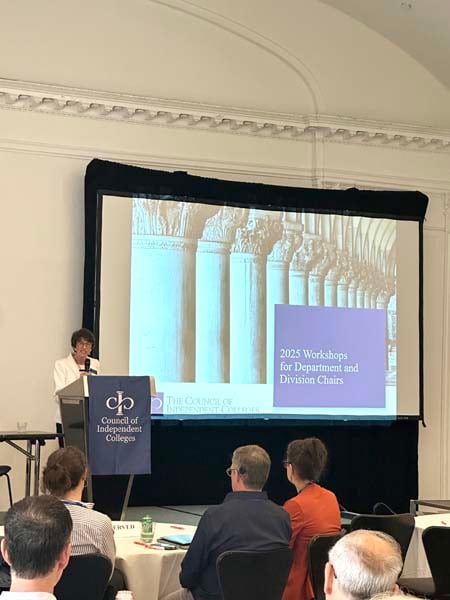
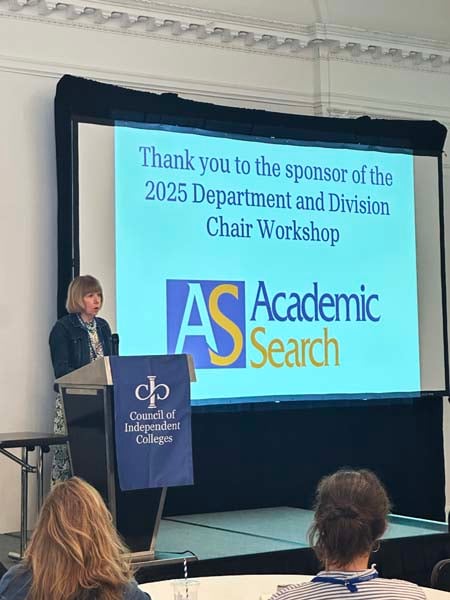
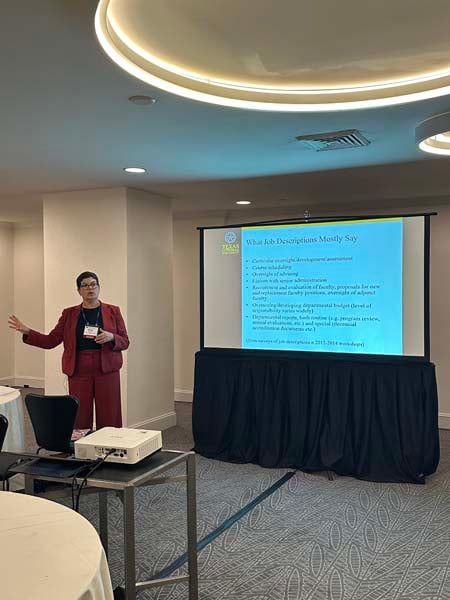
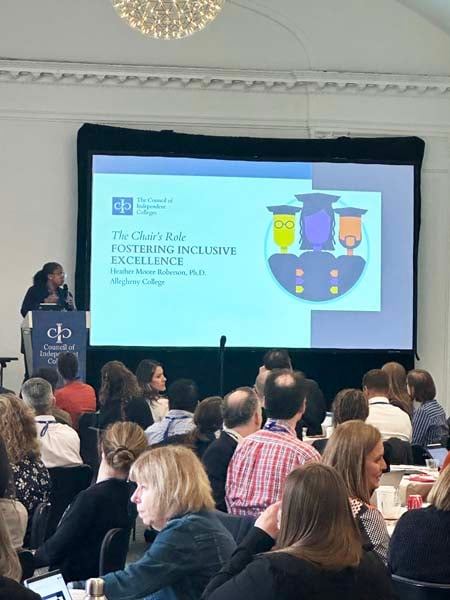
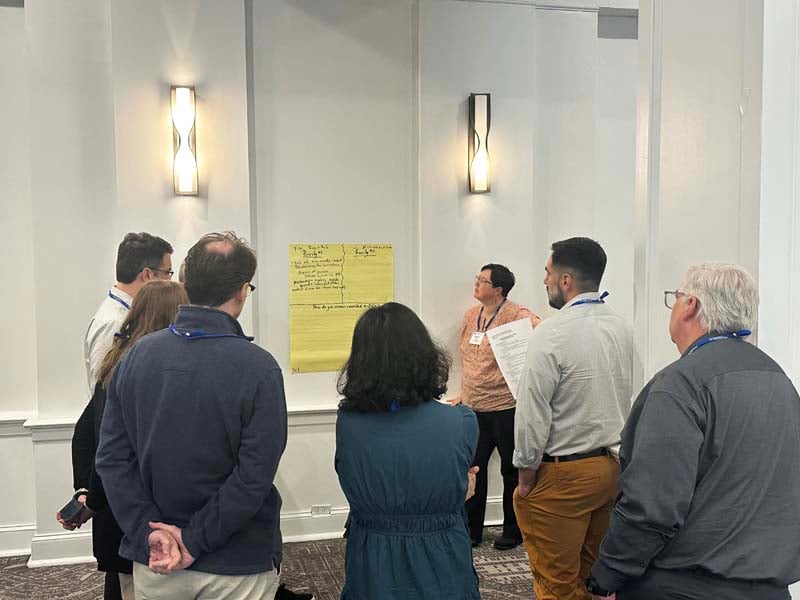
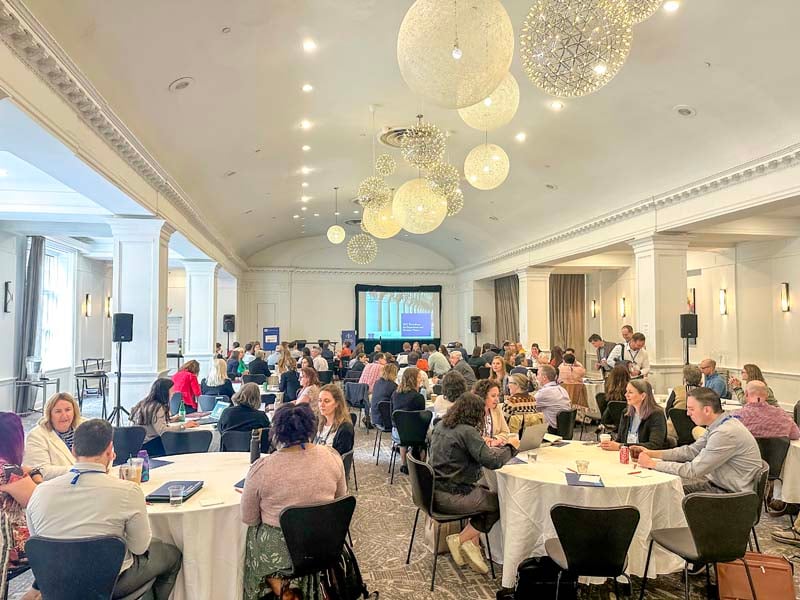
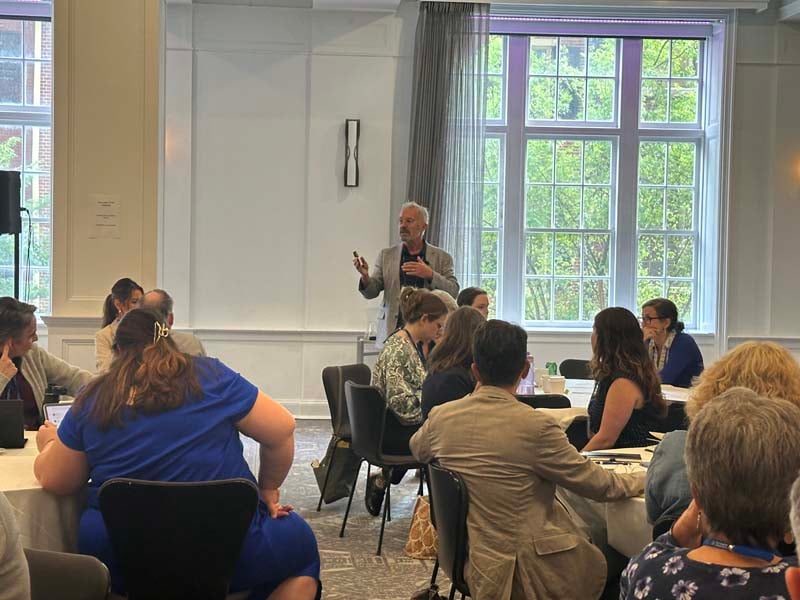
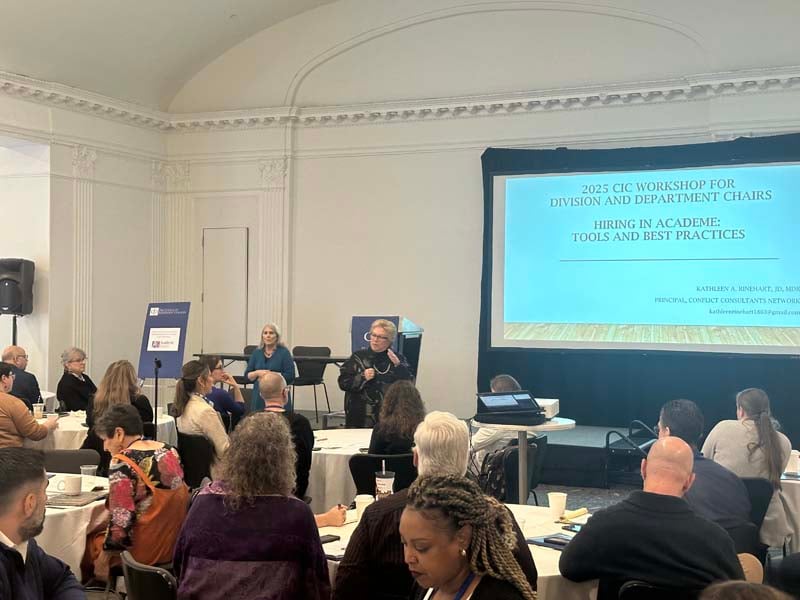
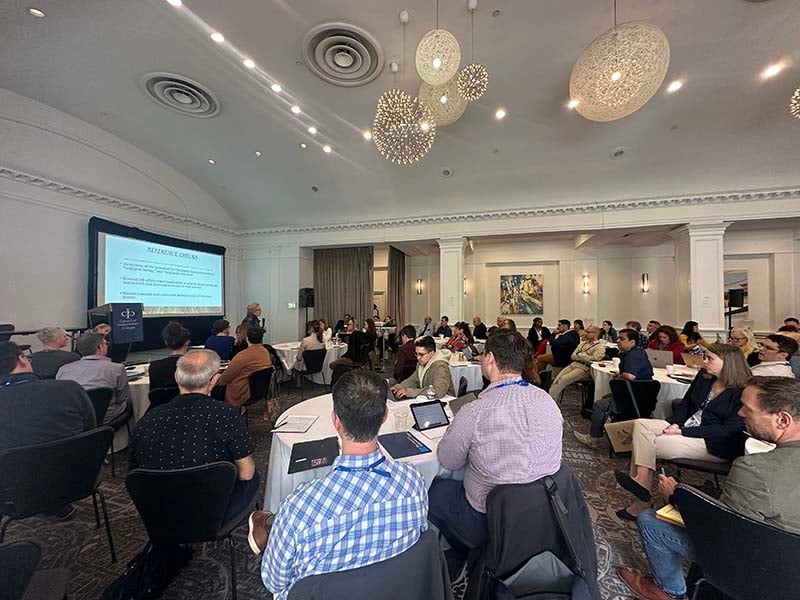
CIC’s Workshops for Department and Division Chairs continue to provide valuable opportunities for collaboration and engagement. In Spring 2025, three successful in-person workshops took place in Atlanta, Santa Fe, and Philadelphia—which proved to be a particularly popular location with over 100 participants. New this year, CIC expanded our global reach and piloted a virtual workshop specifically designed for our international members and the unique issues they face. We were joined by participants from Greece, Saudi Arabia, and Lebanon, among others.
Presidential Vocation and Institutional Mission Program
CIC’s Presidential Vocation and Institutional Mission (V&M) program is designed for senior leaders at CIC member institutions to explore their potential vocational calling to serve as a college or university president, as well as examine what types of institutional missions they might best serve. V&M invites the partners and spouses of senior leaders to join them for this program to reflect on and discern what they envision their role to be if a college or university presidency is in their partner’s future.
This year, a cohort of 36 participants joined together to read and think deeply about meaning and purpose in life as those values are applied to the presidency in independent higher education. Program participants gather in person twice for group seminars. The first seminar took place July 13–16, in Olympic Valley, California. The second seminar will take place this winter in Atlanta, Georgia.
Sessions at the summer seminar encompassed a range of topics, including “Community,” “Discernment,” “Mission,” “Commitment,” “Friendship,” “Saga,” and “Self-Actualization through Vocation.” Notably, we introduced a new session titled “Who You Are Is How You Lead: Strengths in the Vocation Journey.” Led by Wendy Hilton-Morrow, Gallup-certified strengths coach and professor of communication studies at Augustana College (IL), this session provided a comprehensive overview of how a person’s vocation or calling can contribute to their development as a whole individual. It employed Gallup’s Clifton Strengths Finder assessment to guide participants in identifying their personal strengths and the ways in which these can support the mission and values of an institution.
One participant reflected on the experience: “The most helpful aspect was having dedicated time for personal and group reflection without the constant interruptions of work. This created space for meaningful conversations with my spouse about what pursuing a presidency might mean for us, allowing us to more deeply discuss where we might be called to serve and what type of institutions would align with our values. The readings provided a common foundation that really enhanced our discussions with other participants, and the unique perspectives each person brought to the conversations were extremely beneficial in helping me think through my own readiness and calling.”
CIC is grateful to Lilly Endowment Inc. for its ongoing support of the Presidential Vocation and Institutional Mission program.
Presidential Renewal Program
CIC’s Presidential Renewal program, now in its third year, is designed to support the personal revitalization of experienced member presidents at CIC institutions so they may continue to serve in the vital role of the college presidency. Twelve long-serving CIC member presidents participated in the Summer Seminar in June in Carlsbad, California.
The in-person Summer Seminar and an introductory webinar were led by Michael Le Roy, president emeritus of Calvin University (MI), and Celeste Schenck, president emerita of the American University of Paris, who serve as co-directors of the Presidential Renewal program.
The experiential program models personal wellbeing for presidents and their spouses and partners, who are also invited to participate. The Summer Seminar follows an arc from burnout to renewal. The sessions begin with an examination of burnout; they then move to emotional, spiritual, and physical self-evaluation; they examine various paths to renewal; and they end with plans for action and meaningful change.
Susan Traverso, president of Thiel College (PA), offered this reflection: “The CIC Presidential Renewal Program offered my spouse and me a timely opportunity to reflect and reset as I entered my tenth year at Thiel College. Its supportive environment and skilled facilitators fostered honest conversations and emphasized the essential link between personal wellbeing and effective leadership. This program is a meaningful investment in the leaders—and future—of higher education.”
The program is carefully planned to balance discussion of relevant and engaging content, rest and meditation, and time for reflection as a group, as a couple, and as an individual. Group sessions included “The Non-Negotiables of Personal Leadership Renewal,” “Renewal as a Daily Restorative Intentional Practice,” and “Saying NO to Say YES.” The group also had morning and afternoon renewal practices including guided meditation, relaxation yoga, “Terra Divina” walks on the beach, introspective writing, and physical exercise.
Suzanne M. Rivera, president of Macalester College (MN), shared her experience: “I applied to the program with a bit of skepticism about whether any of the conversations or tools would actually benefit me or my spouse after five tough years of surviving this most extraordinary job. I’m so glad I set aside my doubts. Our engagement with the other participants and with our program facilitators was extremely nourishing. We left the first retreat with new skills and with a renewed sense of optimism about our ability as a couple to serve another term, but— this time—in a more sustainable way.”

Participants will continue their renewal journey with a fall webinar and a second in-person seminar immediately preceding the 2026 Presidents Institute.
CIC is hopeful to renew its grant for this program again in the 2026–27 program year; details will be posted on the CIC Renewal Program website.
CIC is grateful to Lilly Endowment Inc. for its support of the Presidential Renewal program.
Teaching Interfaith Understanding Seminar
In June 2025, CIC and Interfaith America held a multidisciplinary seminar on Teaching Interfaith Understanding for full-time faculty members at CIC member colleges and universities at DePaul University in Chicago, Illinois. This long-running seminar series, generously funded by Lilly Endowment Inc., seeks to prepare participants to address the complex religious diversity present on today’s college campuses by equipping them with the knowledge and skills to foster meaningful interfaith dialogue, develop new courses and other resources, and join a network of faculty members who are committed to teaching this subject. Twenty-five faculty members from institutions situated across the country—from Hawaii and Alaska to Florida and Maine—and representing a range of disciplines including religious studies, art history, economics, and biology participated in the seminar. Laurie Patton, formerly president of Middlebury College (VT) and now president of the American Academy of Arts & Sciences (MA), and Eboo Patel, founder and president of Interfaith America, led the seminar.
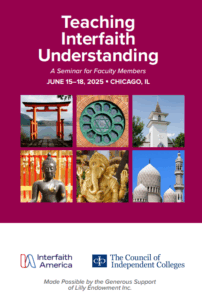
Throughout the week, participants met in both small and large groups to examine the foundational concepts for interfaith leadership development in higher education. In the small group settings, participants discussed teaching strategies and syllabi and shared their own experiences and suggestions. As Benjamin Wintress, assistant professor of theology at Divine Word College (IL), reflected, “The syllabus workshop was extremely helpful. It meant a lot to be able to sit down in a small group with people who had taught World Religions in the past (I have not and will for the first time this fall). I felt like I could really ‘pick their brains’ about what to expect, what works, and what doesn’t.”
The small group sessions also allowed participants to focus on the case studies from their own experiences that had been submitted in advance. Each group then selected one case study for discussion during the larger seminar plenaries. As Kristyn Sessions, assistant professor of religion at Simpson College (IA), reflected on the case studies approach, “The concreteness of the challenges and possible solutions was invaluable. Even if the situation was unfamiliar to me, the conversation always offered relevant advice. In addition, I thought the dialogical format allowed the session to organically move to related concerns.”
As Peter Steiger, associate professor of religious studies at Chaminade University of Honolulu (HI) summarized his experience in this summer’s seminar: “We are all facing challenges, and hearing from others gave me much encouragement, as well as important things to consider. I also benefited greatly from the provocative and challenging ideas about pluralism on college and university campuses nationwide and how faculty can be at the forefront of helping younger American and international students understand why respect for diverse religions is so fundamental to American democracy.”
CIC and Interfaith America will partner on a seminar for Teaching Interfaith Understanding again in Summer 2026 and details about the seminar and nomination process will be announced in the fall.


